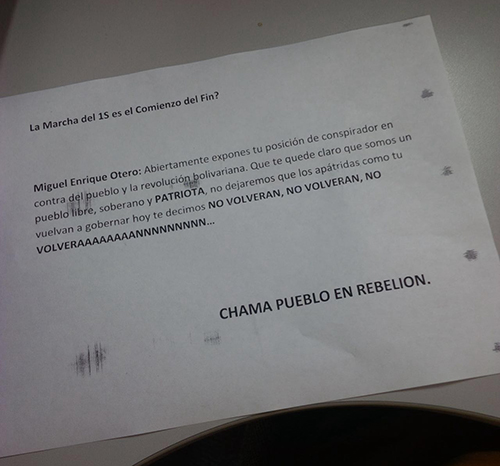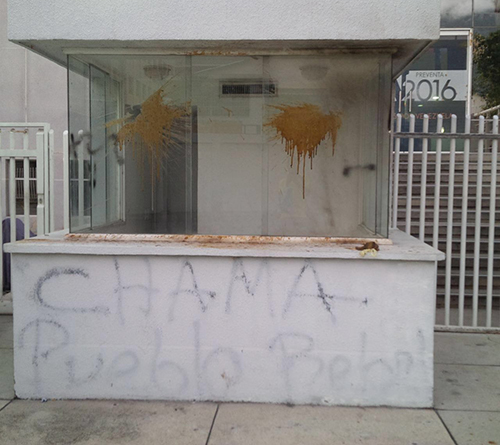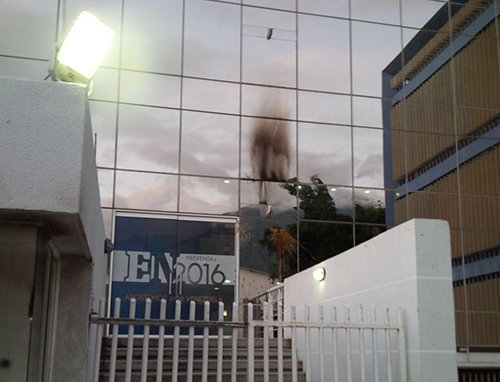New York, August 31, 2016–Authorities should investigate incidents of vandalism of Venezuelan newspaper offices and do everything in their power to ensure that journalists can work without fear of reprisal, the Committee to Protect Journalists said today.
At around 2 a.m. yesterday, excrement and homemade explosives were thrown at the Caracas offices of the Venezuelan daily El Nacional. The attack comes less than a week after a separate incident in which unidentified assailants shot at the façade of Diario de los Andes, based in Valera, in the northwestern state of Trujillo.
In another incident in June, bags of animal excrement were thrown at the offices of Correo del Caroní, a daily newspaper in the eastern city of Puerto Ordaz. Security footage showed five men vandalizing the offices, according to local media reports.
Police are investigating the attack against Diario de los Andes, the paper’s information director, Eylin Barrios, told CPJ. Miguel Otero, editor of El Nacional, also told CPJ that police were investigating the attacks against his paper. When CPJ called the Caracas police and the Public Ministry for comment, the calls went unanswered.
“The attacks against newspaper offices around the country is emblematic of the worsening environment for the press in Venezuela,” said Carlos Lauría, CPJ’s senior program coordinator for the Americas. “Venezuelan authorities must thoroughly investigate these attacks, bring all those responsible to justice, and ensure that journalists can do their work without fear of violence.”
Citing witnesses, El Nacional reported that a group of men arrived at the offices in a white truck and threw homemade explosives and excrement at the premises. According to the report, the men shouted that the paper had betrayed Venezuela. In a similar attack in June El Nacional’s offices were vandalized with spray paint and excrement, according to a report in the online news website RunRun.
In a separate incident, a security guard and another witness saw two men open fire on the offices of the daily Diario de los Andes on August 24, according to Barrios, the information director and a journalist at the newspaper. Barrios told CPJ that the newspaper’s offices suffered significant damage, including broken windows and around 30 bullet holes. The newspaper was targeted on the day that it celebrated its 30th anniversary. Barrios told CPJ that she did not know the motive for the attack.
Both El Nacional and Correo del Caroní have faced harassment and legal persecution from authorities over their critical coverage, CPJ research shows.
Tensions are high in the country, which is in the midst of an economic crisis and political conflict over a proposed recall election to remove President Nicolás Maduro. Opposition leaders have scheduled a protest on September 1 to call on the National Electoral Council to schedule a recall referendum against the president.


The men who attacked El Nacional left a pamphlet titled “The march of 1S is the beginning of the end,” referring to the September 1 march. According to El Nacional, the pamphlet was addressed to the editor of the newspaper. A translation of it read: “Miguel Henrique Otero: you openly expose your conspiratorial position against the people and the Bolivarian Revolution. Let it be clear to you that we are a free people, sovereign and patriotic. We will not allow unpatriotic people like you to govern again. Today we tell you that they will not return.”
The pamphlet was signed “Chama Pueblo en Rebelión” (Chama-the people in rebellion), a pro-government group. The same phrase was spray painted on the front of El Nacional‘s offices in the attack in June, the paper reported.
In a report published on El Nacional‘s website yesterday, Otero said, “They have attacked the façade of El Nacional with excrement again. It seems like this is the only thing left in their brains and it shows their lack of argument. They accuse us of all kinds of things, but they don’t respond with ideas and disputes from their media. They simply appeal to insults, threats, and physical attacks.”
CPJ research shows that under President Maduro, press freedom has deteriorated and independent journalists are restricted in their reporting. Journalists covering protests in Venezuela have faced violence and detentions in recent years.
